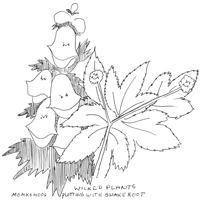STRANGE BUT TRUE- Made cow disease: How bovines and others can kill

DRAWING BY DEBORAH DERR McCLINTOCK
Q. Plants can nourish and heal, but what are a few of Mother Nature's truly "wicked plants," such as the weed that killed Abraham Lincoln's mother? –S. Beauty
A. Cows that eat white snakeroot produce the poison milk that likely undid Nancy Hanks Lincoln, leaving behind nine-year-old Abraham, says Amy Stewart in her book of the above title. Milk sickness was so common that Milk Sick Ridge and Milk Sick Cove are still attached to Southern locales where the disease was rampant.
Stewart points also to a tree that sheds poison daggers, a glistening red seed that stops the heart, a shrub that causes paralysis, and a vine that can strangle– "you don't want to meet these in a dark alley."
Other historical wickednesses include the poison hemlock that killed the Greek philosopher Socrates; ergot, a fungus that grows on rye and causes wild hallucinations, perhaps underlying the deranged behavior leading to the Salem witch trials; monkshood, with a toxin so powerful that Nazi scientists tested it in poison bullets. Even simple corn, when grossly overeaten, can cause the ghastly symptoms of pellagra, a syndrome that may have inspired European myths of vampirism in Bram Stoker's Dracula: pale skin that erupted in blisters when exposed to the sun, sleepless nights brought on by dementia and a morbid appearance just before death.
"Yet without question," concludes Stewart, "the world's most wicked plant is tobacco (nicotiana tabacum), responsible for the deaths of 90 million people worldwide."
Q. When is laughter not the "best medicine," far from it, in fact? Gelotophobes know this one all too well. –S. B. Cohen
A. "Gelotophobia," from the Greek "gelos" for laughter, means the fear of being laughed at and describes people hypersensitive to other's negative moods, says Constance Holden in Science magazine. They mistrust smiling faces and are unable to discriminate between friendly and hostile laughter, i.e., between teasing and ridicule.
This was no laughing matter in the recent school shootings in Germany where the perpetrators reportedly had a horror of being mocked.
About 10 percent of the population has some degree of gelotophobia, note researchers Ilona Papousek and Willibald Ruch in the journal Personality and Individual Differences. In tests covering 74 countries, Scandinavians ranked among the least gelotophobic; the highest scores in Europe were from the United Kingdom, suggesting, Ruch says, that "maybe a well-developed sense of humor does not help where mockery and ridicule are cultivated too."
Q. Love might be "blind," but wouldn't even blind lovers prefer pairing up with attractive partners? –R. Charles
A. Some do, as discussed by University of Birmingham professor John Hull, who himself went blind, says David G. Myers in Psychology. A colleague's remarks on a woman's beauty would strongly affect how Hull felt. He found this "deplorable... What can it matter to me what sighted men think of women... yet I do care, and I do not seem able to throw off this prejudice."
Over-emphasis on looks seems unfair and unenlightened. As the Roman statesman Cicero expressed it two thousand years ago, "The final good and the supreme duty of the wise person is to resist appearance."
A recent analysis of 100 top-grossing films found that attractive characters were portrayed as morally superior to unattractive ones, perhaps explicable in terms of everyday attitudes. But Hollywood's modeling doesn't explain why even babies– to judge from their measured "gazing times"– prefer looking at attractive over unattractive faces!
~
Send Strange questions to brothers Bill and Rich at [email protected].
#